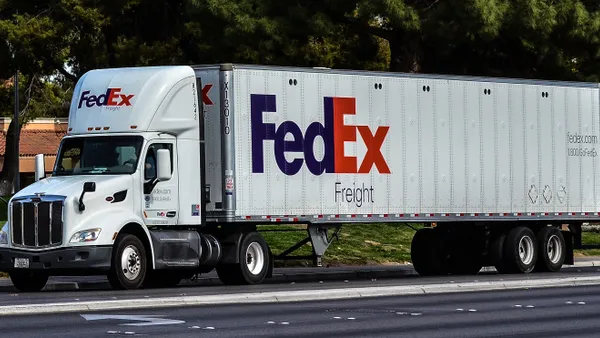Dive Brief:
- Convoy estimates its Automated Reloads program has resulted in a 45% reduction in carbon emissions by reducing the number of empty miles traveled by truckers, the company said in a press release emailed to Supply Chain Dive.
- The Automated Reloads system automatically bundles multiple loads into a single job to reduce empty miles. Convoy said it is bundling more than 50% of jobs in some markets including Atlanta, Los Angeles and St. Louis.
- Ryan Gavin, the Convoy VP of global marketing and communications, said in an emailed statement the company is "seeing a growing trend of shippers" looking for ways to meet their corporate sustainability objectives.
Dive Insight:
Convoy released numbers earlier this year suggesting 33% of truck miles traveled are empty, and very little progress has been made toward lowering this figure since the 1990s.
Convoy introduced the Automated Reloads program in June, but it's not the only company working to put loads on empty tractors. TMS provider Kuebix introduced FleetMAX earlier this year also as a way to "eliminate empty miles," the company said in a press release.
Anheuser-Busch is one of the companies already using Convoy's Automated Reloads feature to batch loads, Angie Slaughter, Anheuser-Busch's VP of sustainability procurement, said in Convoy's press release.
"By reducing these miles, we improve the sustainability of our fleet – taking another step towards our ambitious sustainability goal of reducing carbon emissions by 25% by 2025 – and continue to lead the way towards greater efficiency in the transport market and within our own supply chain," Slaughter said in the statement.
Reducing empty miles as a way to improve carbon emissions is not a new idea. A 2016 report from the Environmental Protection Agency (EPA) on how to create a green freight program gives it a mention. The report estimated that eliminating 15% of a truck’s empty miles could save $3,000 in fuel and reduce carbon dioxide by 24 metric tons annually.
"More efficient freight operations, such as reducing empty-miles, can both help reduce congestion and minimize freight-related infrastructure needs and pollution," the report reads.
The EPA suggested better load matching and more efficient routing, through practices like triangular routing and improving coordination with other loads and fleets. It also said the increased use of GPS technology along with freight broker services and logistics software would help to reduce empty miles.
As fleets look to lower their emissions, companies are also looking at alternative fuels, electric vehicles or even turning to intermodal options as they explore cleaner ways to transport freight.














